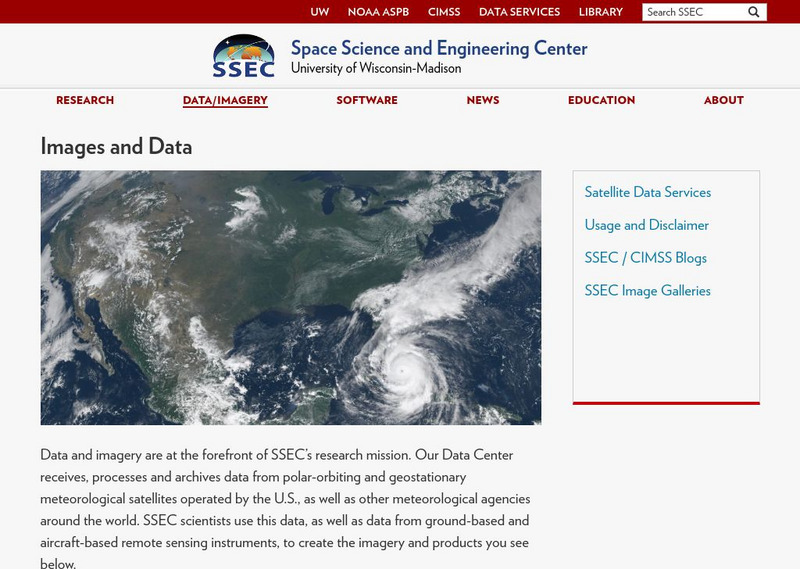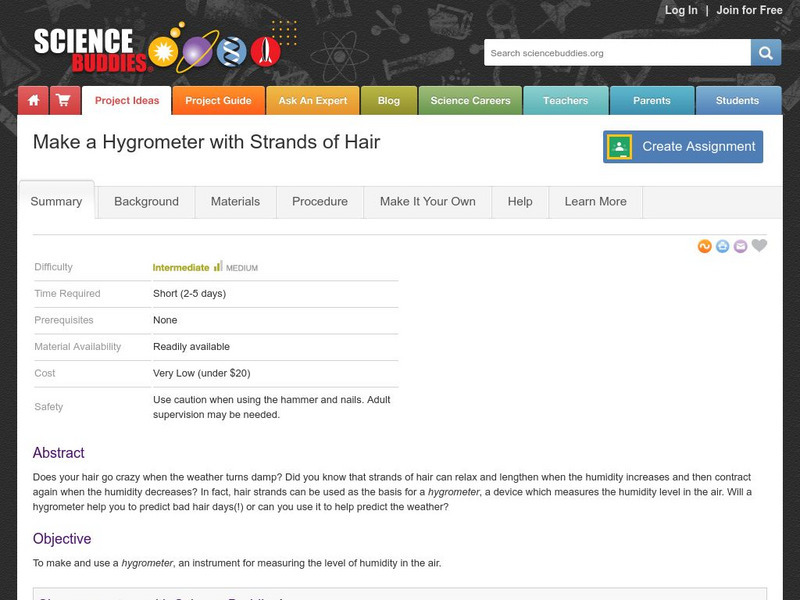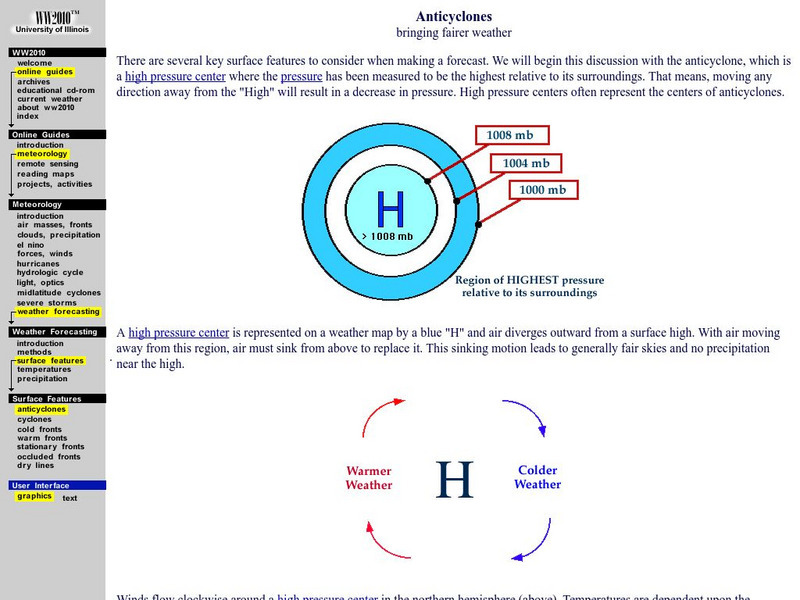Hi, what do you want to do?
Center for Educational Technologies
Severe Weather: Hurricane Watch
Hurricanes are the most powerful of storms. Using satellite images, this site allows you to plot the path of a hurricane and predict when it will strike land.
University of Wisconsin
Ssec: Real Time Imagery and Data: Satellite Images of the Earth
Check out real-time satellite photos of the earth to study weather patterns.
CK-12 Foundation
Ck 12: Plix Series: Gas Mixture and Molecular Speeds
[Free Registration/Login Required] Hike to the top of Mt. Everest and observe what happens to the amount of molecules pushing down on the surface of the Earth. After the activity, answer one challenge question about the topic.
PBS
Pbs Learning Media: Earth System: El Nino's Influence on Hurricane Formation
This video segment adapted from NASA's Goddard Space Flight Center explains how and where hurricanes develop. Learn how El Nino events alter the course of atmospheric circulation. Includes background reading material and discussion...
King's Centre for Visualization in Science
Explaining Climate Change: Lesson 1: Introduction to Earth's Climate
This is the first lesson in a series of learning modules on the topic of climate change. It explores Earth's unique climate and atmosphere, regional climate differences, and temporal climate differences. Includes comprehension questions...
NOAA
Noaa: Pacific Marine Environmental Laboratory: What Is El Nino?
This page tells you what El Nino is, provides links to animations and videos on El Nino, explains how to recognize El Nino, and discusses the history of significant El Nino events.
Idaho State University
Global Wind Systems [Pdf]
A great description of the global scale circulation and heat energy. Discusses a single-cell model, a three-cell model, jet streams and more.
Science Buddies
Science Buddies: Cumulus Maximus: Make Your Own Cloud!
In this experiment, you'll make your own cloud in a jar, and get to test the conditions that are required to make a cloud form.
University Corporation for Atmospheric Research
Ucar: Project Sky Math
Teachers will be interested to explore the SkyMath module, and the 16 classroom activities at this site. In this program, students will collect and record real-time weather data to analyze. Data analysis, graphing, number relationship,...
Ducksters
Ducksters: Science for Kids: Earth's Atmosphere
Kids learn about the science of the Earth's Atmosphere. Carbon dioxide, Oxygen, Nitrogen and more make up clouds and weather.
Curated OER
Physical geography.net: Introduction to the Atmosphere
A very detailed description of air masses, how they move and interact, and what weather takes place when this happens.
Bill Nye
Bill Nye: Barometer in a Bottle
This tutorial by Bill Nye explains how to make a simple barometer using a jar and a balloon. The barometer is an old and accurate first look at predicting the weather by examining the pressure of the atmosphere. Discover how atmospheric...
CK-12 Foundation
Ck 12: Earth Science: Heat Budget of Planet Earth
[Free Registration/Login may be required to access all resource tools.] The balance of heat entering and exiting Earth's atmosphere.
Center of Science and Industry
Cosi Columbus: Clues About Clouds
Science experiment that simulates how clouds are formed. Includes full list of materials, procedures, and scientific explanation of what must happen in the atmosphere for cloud formation to occur.
Other
Climate Gateway: What Is Climate Change?
This ClimateGateway.com site provides information on what climate change is as well as the factors that affect global climate.
University Corporation for Atmospheric Research
Ucar: Climate
The climate where you live is called regional climate. Global climate is a description of the climate of a planet as a whole, with all the regional differences averaged. Includes links to additional resources on climate and climate change.
NOAA
Noaa: History: Weather Man Poems
This site from the NOAA contains several examples of poetry dedicated to the infamous "Weather Man."
NOAA
Noaa: Weather Prediction and Detection
Learn how the tools for weather prediction has changed in this article.
Space Telescope Science Institute
Hubblesite: Movie of Neptune's Rotation and Weather
This site from Hubblesite provides information on the Hubble Telescope. NASA's Hubble Space Telescope has been used to assemble a time-lapse color movie showing a full 16-hour rotation of the distant planet, Neptune.
Science Buddies
Science Buddies: Make a Hygrometer With Strands of Hair
Does your hair go crazy when the weather turns damp? Did you know that strands of hair can relax and lengthen when the humidity increases and then contract again when the humidity decreases? In fact, hair strands can be used as the basis...
University of Illinois
University of Illinois Urbana Champaign: Surface Features to Consider When Forecasting
This site looks at the important surface features to consider when making a forecast. High pressure and atmospheric pressure is explained. Be sure to use the arrows at the bottom to navigate through this site.
Other
Mcdwn: Climate
Wonderful site! Learn about climates and gather helpful information. When you are done, take the climates quiz to show what you have learned.
University Corporation for Atmospheric Research
Ucar: Fact Sheet for El Nino
This site from the Univ. Corp. for Atmospheric Research provides detailed information on El Nino and its effects on the trade winds is offered at this site, with satellite photos.
Science Struck
Science Struck: Interpreting Barometric Pressure Readings
Explains how to read a barometer and interpret its meaning, as well as how the barometer was invented.

















